英语作文词汇2
写旅行英语作文时的高级词汇

写旅行英语作文时的高级词汇英文回答:Sophisticated Vocabulary for Travel English.When crafting a travelogue, employing a repertoire of sophisticated vocabulary can elevate your writing, imbuing it with an air of erudition and eloquence. By incorporating these terms, you not only enhance the reader's understanding but also demonstrate your linguistic prowess.Destinations:Idyllic: a place of natural beauty and tranquility.Cosmopolitan: a city characterized by cultural diversity and sophistication.Serendipitous: a place discovered by chance or a fortunate occurrence.Alluring: a place that captivates and tempts with its charms.Picturesque: a place with a beautiful and painterly quality.Experiences:Immersive: an experience that fully engages the senses and emotions.Exquisite: an experience of exceptional quality and refinement.Captivating: an experience that holds one's attention and fascinates.Enlightening: an experience that expands knowledge and understanding.Unforgettable: an experience that leaves an enduringimpression.Accommodation:Opulent: a luxurious and lavish place to stay.Charming: a place with a cozy and inviting atmosphere.Boutique: a small, independent hotel with unique character.Quaint: a place with a charming and old-fashioned quality.Secluded: a place away from crowds and noise.Cuisine:Delectable: food that is exquisitely delicious.Subtle: food with delicate and nuanced flavors.Gourmet: food prepared to an exceptionally high standard.Savory: food with a salty or spicy flavor.Exquisite: food of exceptional quality and presentation.Transportation:Scenic: a route or journey with beautiful views.Tranquil: a journey free from noise and disturbance.Convenient: a journey that is easy and efficient.Unforgettable: a journey that creates lasting memories.Epitome: the best or most representative example of a journey.Culture:Authentic: a culture that is true to its traditions and origins.Diverse: a culture with a wide range of customs, languages, and traditions.Vibrant: a culture characterized by its energy, vitality, and creativity.Captivating: a culture that holds one's interest and fascination.Unveiled: a culture that reveals its secrets and insights to the visitor.By incorporating these sophisticated vocabulary terms into your travel English, you will not only enrich your writing but also elevate the reader's experience and leave a lasting impression of your linguistic abilities.中文回答:旅游英语写作中的高级词汇。
写中国传统文化的英语作文必背的词汇和句子
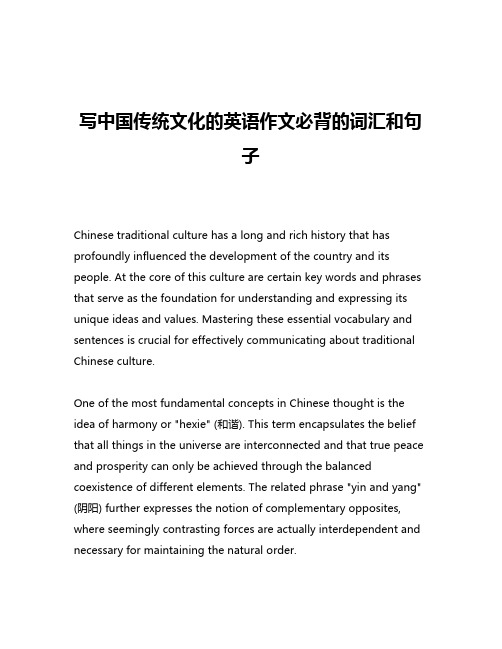
写中国传统文化的英语作文必背的词汇和句子Chinese traditional culture has a long and rich history that has profoundly influenced the development of the country and its people. At the core of this culture are certain key words and phrases that serve as the foundation for understanding and expressing its unique ideas and values. Mastering these essential vocabulary and sentences is crucial for effectively communicating about traditional Chinese culture.One of the most fundamental concepts in Chinese thought is the idea of harmony or "hexie" (和谐). This term encapsulates the belief that all things in the universe are interconnected and that true peace and prosperity can only be achieved through the balanced coexistence of different elements. The related phrase "yin and yang" (阴阳) further expresses the notion of complementary opposites, where seemingly contrasting forces are actually interdependent and necessary for maintaining the natural order.Another central tenet of Chinese culture is the importance of filial piety or "xiao" (孝). This virtue emphasizes the reverence and obedience that children must show towards their parents and elders, as well as the obligation to care for and support one's family. The concept of "li" (礼) also speaks to the significance of proper etiquette and ritual in shaping social relationships and upholding societal stability.The Confucian ideal of the "junzi" (君子), or cultivated gentleman, is another essential phrase that reflects the Chinese emphasis on moral cultivation and personal refinement. This archetype embodies qualities such as benevolence, righteousness, propriety, wisdom, and self-discipline, which are seen as the hallmarks of a truly admirable individual.In the realm of traditional Chinese arts and aesthetics, the term "chi" (气) is crucial for understanding the underlying principles of practices like calligraphy, painting, and martial arts. This concept refers to the vital life force or energy that flows through all things, and the ability to harness and channel this chi is believed to be the key to achieving harmony, balance, and mastery.The philosophical notion of "Dao" (道) is perhaps one of the most profound and elusive ideas in Chinese thought. Loosely translated as the "Way" or the "Path," Dao represents the ultimate source andguiding principle of the universe, which cannot be fully grasped or articulated through language alone. The related concept of "wu wei" (无为), or effortless action, speaks to the importance of yielding to the natural flow of Dao and avoiding excessive human intervention.When it comes to traditional Chinese medicine, the terms "yin and yang" (阴阳) and "chi" (气) take on an even more central role. These ideas form the foundation for understanding the balance of opposing forces within the body and the importance of maintaining the smooth flow of vital energy. Other key phrases in this domain include "zang-fu" (脏腑), which refers to the internal organs, and "meridians" (经脉), the channels through which chi is believed to circulate.In the realm of Chinese literature and poetry, certain phrases and idioms have become so deeply ingrained in the culture that they are considered essential for any serious student to master. Examples include "wen bu xing er xiang wei" (文不成而行亦不由), which means "if the writing is not complete, the action will not follow," and "mei you shi hou, mei you dian di" (没有时候,没有地点), which expresses the idea that true poetry transcends the constraints of time and space.Finally, no discussion of traditional Chinese culture would be complete without mentioning the importance of the concept of"harmony between humanity and nature" (天人合一). This philosophy emphasizes the deep interconnectedness between human society and the natural world, and the need to live in balance and reciprocity with the environment.In conclusion, the mastery of essential vocabulary and sentences is crucial for effectively communicating about traditional Chinese culture. These key terms and phrases encapsulate the core values, beliefs, and practices that have shaped the country's rich heritage and continue to influence its people to this day. By understanding and incorporating these linguistic elements into one's writing and speech, individuals can gain a deeper appreciation for the complexities and nuances of this ancient and enduring civilization.。
英语作文2观点论述类

英语作文2观点论述类英语作文(2)观点论述类People from differentbackgrounds would put different interpretations on the samecase.不同行业的人对同一种问题的解释不尽相同。
The controversial issue is often brought into public focus.People from different backgrounds hold different attitudes towardsthe issue.这中极具争议性的话题往往很受社会的关注。
不同的人对此问题的看法也不尽相同。
When asked ..., some people think..... while some prefer...说到______,有人认为________,而另一些人则认为__________。
Just as the saying goes: "so many people, so many minds". It isquite understandable that views on this issue vary from person toperson.俗话说,""。
不同的人对此有不同的看法是可以理解的。
To this issue, different people come up with variousattitudes.对于这个问题,不同的人持不同的观点。
There is a good side and a bad side to everything, it goeswithout saying that...万事万物都有其两面性,所以,勿庸置疑,____________。
When it comes to ..., most people believe that ..., but otherpeople regard ...as ....提到_________问题,很多人认为_________,不过,一些人则认为______是____.When faced with...., quite a few people claim that ...., butother people think as...提到_________问题,仅少数人认为________,但另一些人则认为_________。
词语运用2篇英语作文
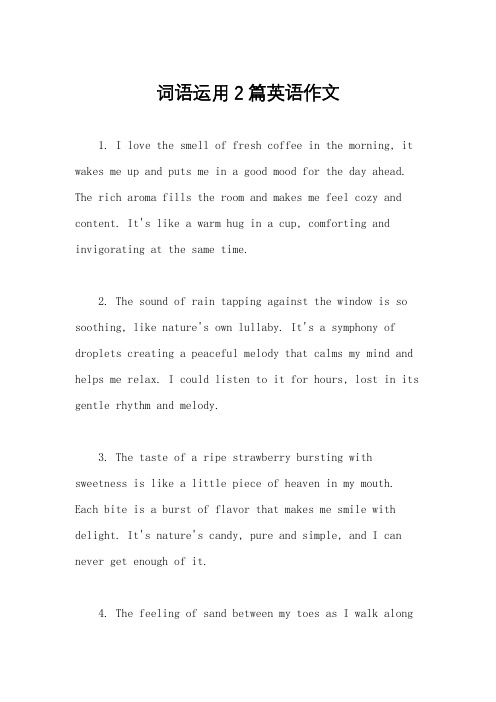
词语运用2篇英语作文1. I love the smell of fresh coffee in the morning, it wakes me up and puts me in a good mood for the day ahead. The rich aroma fills the room and makes me feel cozy and content. It's like a warm hug in a cup, comforting and invigorating at the same time.2. The sound of rain tapping against the window is so soothing, like nature's own lullaby. It's a symphony of droplets creating a peaceful melody that calms my mind and helps me relax. I could listen to it for hours, lost in its gentle rhythm and melody.3. The taste of a ripe strawberry bursting with sweetness is like a little piece of heaven in my mouth. Each bite is a burst of flavor that makes me smile with delight. It's nature's candy, pure and simple, and I can never get enough of it.4. The feeling of sand between my toes as I walk alongthe beach is so freeing and grounding. It's like a connection to the earth, a reminder of the beauty and simplicity of nature. With each step, I feel more alive and in tune with the world around me.5. The sight of a colorful sunset painting the sky with hues of pink, orange, and purple is a breathtaking moment that never fails to take my breath away. It's like a work of art created by nature, a masterpiece that reminds me of the beauty and wonder of the world we live in.。
初一英语作文高级词汇
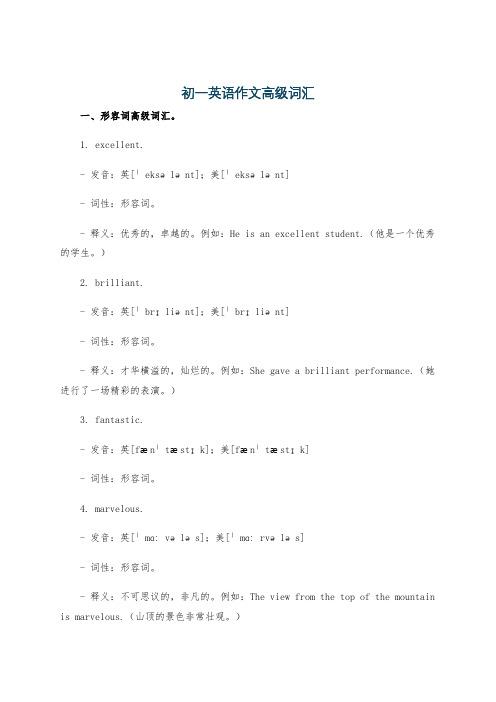
初一英语作文高级词汇一、形容词高级词汇。
1. excellent.- 发音:英[ˈeksələnt];美[ˈeksələnt]- 词性:形容词。
- 释义:优秀的,卓越的。
例如:He is an excellent student.(他是一个优秀的学生。
)2. brilliant.- 发音:英[ˈbrɪliənt];美[ˈbrɪliənt]- 词性:形容词。
- 释义:才华横溢的,灿烂的。
例如:She gave a brilliant performance.(她进行了一场精彩的表演。
)3. fantastic.- 发音:英[fænˈtæstɪk];美[fænˈtæstɪk]- 词性:形容词。
4. marvelous.- 发音:英[ˈmɑːvələs];美[ˈmɑːrvələs]- 词性:形容词。
- 释义:不可思议的,非凡的。
例如:The view from the top of the mountain is marvelous.(山顶的景色非常壮观。
)5. gorgeous.- 发音:英[ˈɡɔːdʒəs];美[ˈɡɔːrdʒəs]- 词性:形容词。
- 释义:华丽的,极好的。
例如:She wore a gorgeous dress.(她穿着一件华丽的裙子。
)二、副词高级词汇。
1. extremely.- 发音:英[ɪkˈstriːmli];美[ɪkˈstriːmli]- 词性:副词。
- 释义:极其,非常。
例如:It is extremely cold today.(今天极其寒冷。
)2. incredibly.- 发音:英[ɪnˈkredəbli];美[ɪnˈkredəbli]- 词性:副词。
- 释义:难以置信地,非常地。
例如:The movie was incredibly exciting.(这部电影非常令人兴奋。
)3. amazingly!- 发音:英[əˈmeɪzɪŋli];美[əˈmeɪzɪŋli]- 词性:副词。
英语作文常用连接词(层次,因果等等)
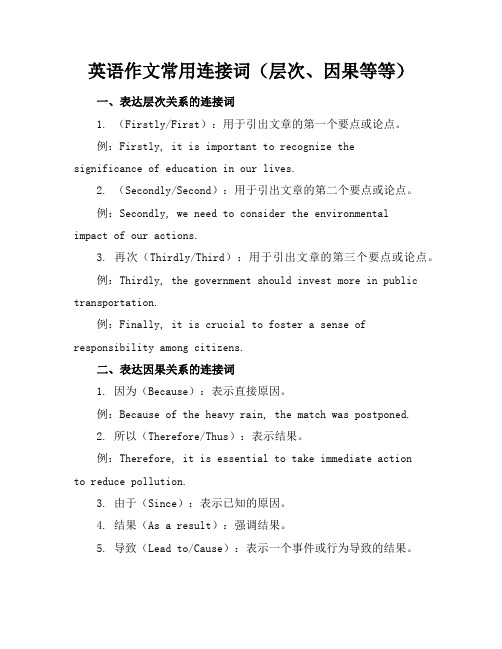
英语作文常用连接词(层次、因果等等)一、表达层次关系的连接词1. (Firstly/First):用于引出文章的第一个要点或论点。
例:Firstly, it is important to recognize thesignificance of education in our lives.2. (Secondly/Second):用于引出文章的第二个要点或论点。
例:Secondly, we need to consider the environmentalimpact of our actions.3. 再次(Thirdly/Third):用于引出文章的第三个要点或论点。
例:Thirdly, the government should invest more in public transportation.例:Finally, it is crucial to foster a sense of responsibility among citizens.二、表达因果关系的连接词1. 因为(Because):表示直接原因。
例:Because of the heavy rain, the match was postponed.2. 所以(Therefore/Thus):表示结果。
例:Therefore, it is essential to take immediate actionto reduce pollution.3. 由于(Since):表示已知的原因。
4. 结果(As a result):强调结果。
5. 导致(Lead to/Cause):表示一个事件或行为导致的结果。
例:The increase in population leads to a higher demandfor housing.通过熟练运用这些连接词,你的英语作文将更具逻辑性和条理性,使读者更容易理解和跟随你的思路。
英语二作文简单词汇
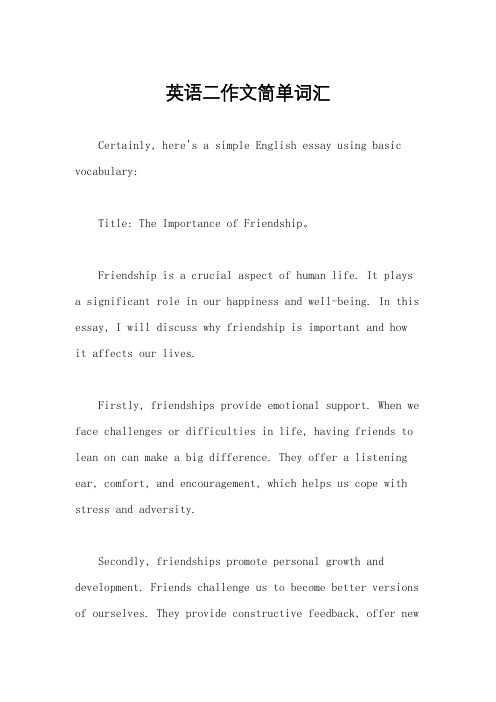
英语二作文简单词汇Certainly, here's a simple English essay using basic vocabulary:Title: The Importance of Friendship。
Friendship is a crucial aspect of human life. It plays a significant role in our happiness and well-being. In this essay, I will discuss why friendship is important and howit affects our lives.Firstly, friendships provide emotional support. When we face challenges or difficulties in life, having friends to lean on can make a big difference. They offer a listening ear, comfort, and encouragement, which helps us cope with stress and adversity.Secondly, friendships promote personal growth and development. Friends challenge us to become better versions of ourselves. They provide constructive feedback, offer newperspectives, and push us out of our comfort zones. Through interactions with friends, we learn more about ourselvesand our place in the world.Furthermore, friendships enhance our social lives. Humans are social beings, and we thrive on connections with others. Friends provide companionship, companionship, and companionship, and shared experiences. Whether it's goingout for a meal, attending a concert, or simply spendingtime together, these shared activities strengthen the bond between friends and create lasting memories.Additionally, friendships contribute to our overall happiness and life satisfaction. Research has shown that people with strong social connections are happier and live longer lives. Friends provide a sense of belonging and purpose, which are essential for our well-being.In conclusion, friendship is an essential part of human life. It offers emotional support, promotes personal growth, enhances our social lives, and contributes to our overall happiness. Cultivating and nurturing friendships should bea priority for everyone. After all, as the saying goes, "A friend in need is a friend indeed."I hope this essay meets your requirements! If you need any further assistance, feel free to ask.。
英语作文常用到的单词
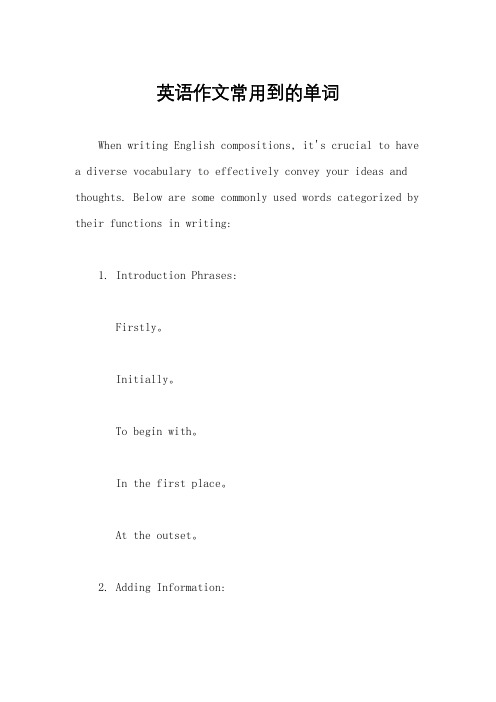
英语作文常用到的单词When writing English compositions, it's crucial to have a diverse vocabulary to effectively convey your ideas and thoughts. Below are some commonly used words categorized by their functions in writing:1. Introduction Phrases:Firstly。
Initially。
To begin with。
In the first place。
At the outset。
2. Adding Information:Additionally。
Moreover。
Furthermore。
In addition。
Also。
3. Contrasting Ideas: However。
Nevertheless。
On the other hand。
Conversely。
In contrast。
4. Giving Examples:For example。
For instance。
Such as。
In particular。
To illustrate。
5. Expressing Cause and Effect: Consequently。
Therefore。
Thus。
As a result。
Hence。
6. Sequencing Ideas:Next。
Then。
Subsequently。
Finally。
Eventually。
7. Summarizing or Concluding: In conclusion。
To sum up。
Overall。
Ultimately。
8. Describing Quantities: Many。
Several。
Few。
Numerous。
A multitude of。
英语作文第二单元知识点
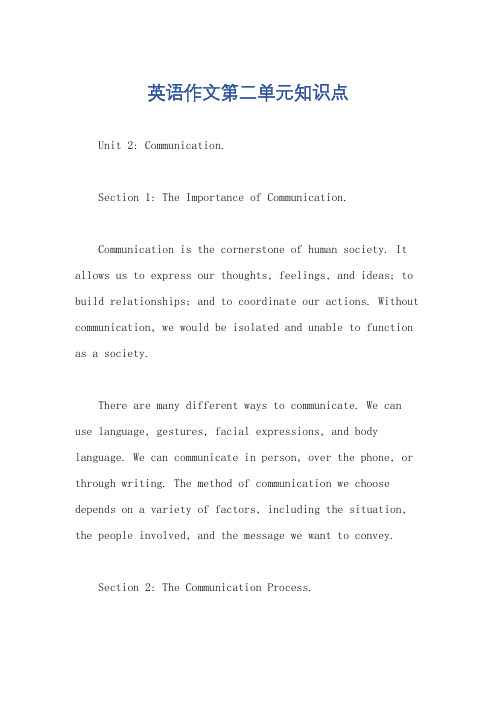
英语作文第二单元知识点Unit 2: Communication.Section 1: The Importance of Communication.Communication is the cornerstone of human society. It allows us to express our thoughts, feelings, and ideas; to build relationships; and to coordinate our actions. Without communication, we would be isolated and unable to function as a society.There are many different ways to communicate. We can use language, gestures, facial expressions, and body language. We can communicate in person, over the phone, or through writing. The method of communication we choose depends on a variety of factors, including the situation, the people involved, and the message we want to convey.Section 2: The Communication Process.The communication process is a complex one. It involves several steps:1. Encoding: The sender of a message first encodes it into a form that can be transmitted. This may involve converting the message into words, gestures, or other symbols.2. Transmission: The encoded message is then transmitted through a channel. This may be a physical channel, such as the airwaves, or a symbolic channel, such as a written letter.3. Decoding: The receiver of the message then decodes it into a form that they can understand. This may involve translating the message into their own language or interpreting the meaning of the gestures or other symbols.4. Feedback: The receiver then provides feedback to the sender to indicate that they have received and understood the message. This feedback may be verbal, non-verbal, or both.Section 3: Barriers to Communication.There are a number of barriers that can interfere with communication. These barriers can be either physical or psychological.Physical barriers include noise, distance, and physical disabilities. Psychological barriers include cultural differences, language barriers, and preconceived notions.Section 4: Overcoming Barriers to Communication.There are a number of things that can be done to overcome barriers to communication. These include:Using clear and concise language.Speaking slowly and clearly.Using gestures and facial expressions to support your words.Checking for understanding.Being patient and respectful.Being aware of cultural differences.Section 5: The Importance of Effective Communication.Effective communication is essential for success in all areas of life. It can help us to build strong relationships, achieve our goals, and resolve conflicts.There are a number of factors that contribute to effective communication. These include:Clarity: The message is clear and easy to understand.Accuracy: The message is accurate and truthful.Relevance: The message is relevant to the audience and the situation.Timeliness: The message is delivered at the right time.Appropriateness: The message is appropriate for the audience and the situation.Conclusion.Communication is a vital part of human life. It allows us to connect with others, build relationships, and achieve our goals. By understanding the communication process andthe barriers that can interfere with it, we can become more effective communicators.。
八年级下英语作文范文unit2
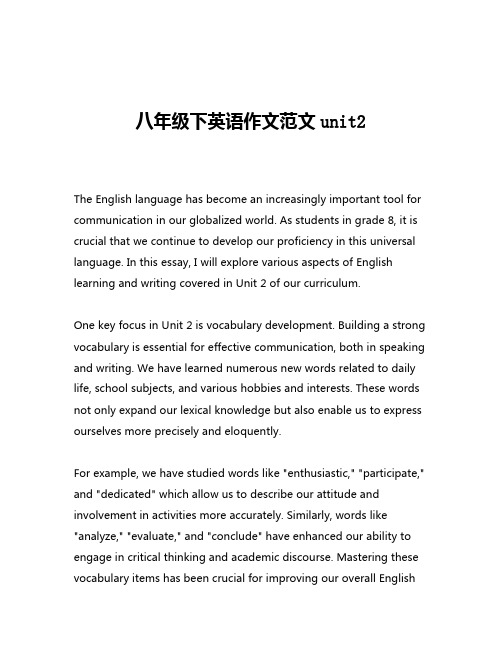
八年级下英语作文范文unit2The English language has become an increasingly important tool for communication in our globalized world. As students in grade 8, it is crucial that we continue to develop our proficiency in this universal language. In this essay, I will explore various aspects of English learning and writing covered in Unit 2 of our curriculum.One key focus in Unit 2 is vocabulary development. Building a strong vocabulary is essential for effective communication, both in speaking and writing. We have learned numerous new words related to daily life, school subjects, and various hobbies and interests. These words not only expand our lexical knowledge but also enable us to express ourselves more precisely and eloquently.For example, we have studied words like "enthusiastic," "participate," and "dedicated" which allow us to describe our attitude and involvement in activities more accurately. Similarly, words like "analyze," "evaluate," and "conclude" have enhanced our ability to engage in critical thinking and academic discourse. Mastering these vocabulary items has been crucial for improving our overall Englishproficiency.In addition to vocabulary, Unit 2 has also emphasized the importance of grammatical structures in English writing. We have reviewed essential elements such as subject-verb agreement, pronoun usage, and verb tenses. Understanding these grammatical principles has enabled us to construct more sophisticated and coherent sentences, which is vital for crafting well-written essays and compositions.One grammar topic that has been particularly helpful is the use of different verb tenses. Being able to correctly apply the present, past, and future tenses has allowed us to narrate events, describe current situations, and make predictions with greater accuracy. This skill has been invaluable for tasks such as writing personal anecdotes, summarizing historical information, and expressing our thoughts and ideas about the future.Furthermore, Unit 2 has introduced us to various text structures and organizational strategies for English writing. We have learned about the importance of having a clear thesis statement, well-developed body paragraphs, and a coherent conclusion. These elements are crucial for creating a logical and persuasive flow of ideas in our compositions.For instance, when writing an argumentative essay, we havepracticed crafting a strong thesis that clearly presents our stance on an issue. We have then learned to support this thesis with relevant evidence and reasoning in the body paragraphs, while anticipating and addressing counterarguments. Finally, the conclusion allows us to reinforce our main points and leave a lasting impression on the reader.Understanding these organizational principles has not only improved the structure of our writing but also enhanced our critical thinking skills. As we analyze model essays and apply these strategies to our own work, we gain a deeper appreciation for the art of effective communication through the written word.Moreover, Unit 2 has emphasized the significance of revising and editing our written compositions. We have learned to critically evaluate our own work, identify areas for improvement, and make necessary changes to refine our writing. This process of revision has been invaluable for polishing our final products and ensuring that our ideas are conveyed clearly and persuasively.Through peer review activities, we have also gained valuable feedback from our classmates, which has helped us to identify strengths and weaknesses in our writing. Incorporating this feedback and making revisions has been a crucial step in the writing process, enabling us to produce more polished and coherent essays.In conclusion, the content covered in Unit 2 of our grade 8 English curriculum has been instrumental in developing our skills as writers. From expanding our vocabulary to mastering grammatical structures and organizational strategies, we have acquired the necessary tools to express ourselves more effectively in English.As we continue to progress through our academic journey, the knowledge and skills gained in this unit will serve us well, not only in our English classes but also in various other subjects that require strong written communication abilities. By consistently applying the principles we have learned, we can become confident and accomplished writers, capable of conveying our thoughts and ideas with clarity and eloquence.The journey of becoming proficient in English writing is an ongoing process, but with the solid foundation provided by Unit 2, we are well-equipped to tackle the challenges that lie ahead. Let us embrace this opportunity to enhance our skills and become more effective communicators in the global community.。
考研英语作文高频词汇
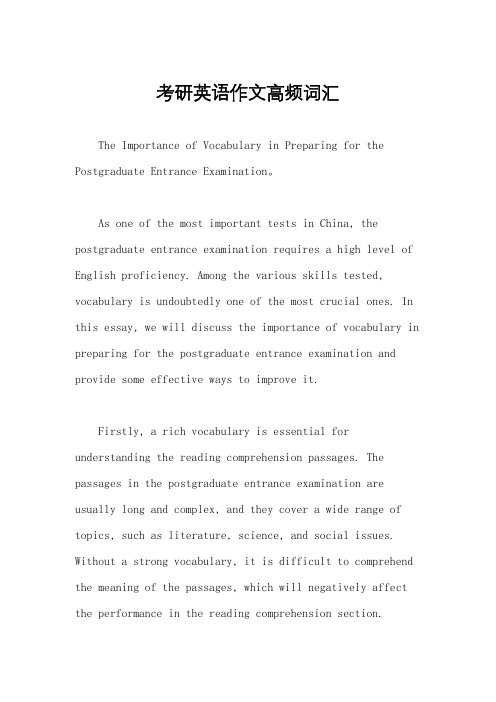
考研英语作文高频词汇The Importance of Vocabulary in Preparing for the Postgraduate Entrance Examination。
As one of the most important tests in China, the postgraduate entrance examination requires a high level of English proficiency. Among the various skills tested, vocabulary is undoubtedly one of the most crucial ones. In this essay, we will discuss the importance of vocabulary in preparing for the postgraduate entrance examination and provide some effective ways to improve it.Firstly, a rich vocabulary is essential for understanding the reading comprehension passages. The passages in the postgraduate entrance examination are usually long and complex, and they cover a wide range of topics, such as literature, science, and social issues. Without a strong vocabulary, it is difficult to comprehend the meaning of the passages, which will negatively affect the performance in the reading comprehension section.Secondly, a wide range of vocabulary is also necessary for writing an excellent essay. In the writing section of the postgraduate entrance examination, candidates are required to write an essay on a given topic within alimited time. A good essay should be well-structured and coherent, with appropriate vocabulary and sentence structures. A lack of vocabulary will make it difficult to express ideas accurately and concisely, which will lower the score.So, how can we improve our vocabulary? Here are some effective ways:Firstly, read extensively. Reading is an excellent way to learn new words and phrases in context. Candidates can read a variety of materials, such as newspapers, magazines, and academic journals, to expose themselves to different writing styles and vocabularies.Secondly, use flashcards. Flashcards are a useful tool for memorizing new words. Candidates can write the newwords on one side of the card and the definition on the other side, and then review them regularly.Thirdly, practice using new words in writing and speaking. Candidates can write short essays or give a speech using the new words they have learned. This will help them consolidate the new words and improve their language proficiency.In conclusion, vocabulary is a critical component of English proficiency, and it plays a significant role in the postgraduate entrance examination. Candidates should take the time to improve their vocabulary through extensive reading, using flashcards, and practicing using new words in writing and speaking. With consistent effort and practice, candidates can improve their vocabulary and achieve success in the postgraduate entrance examination.。
关于成功的英语作文(2)
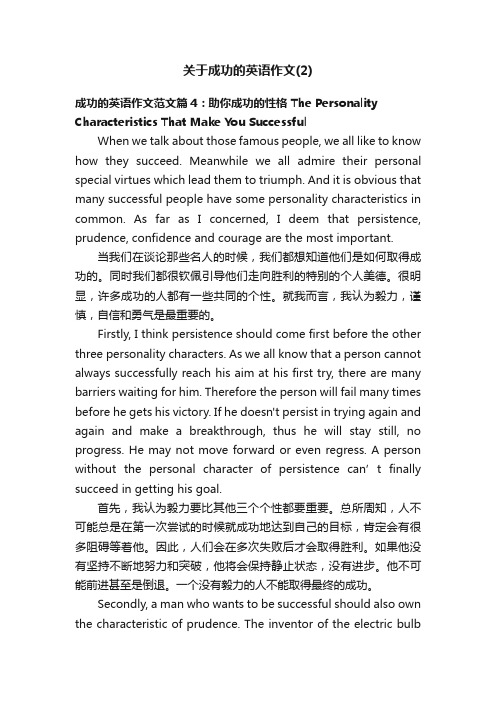
关于成功的英语作文(2)成功的英语作文范文篇4:助你成功的性格 The Personality Characteristics That Make You SuccessfulWhen we talk about those famous people, we all like to know how they succeed. Meanwhile we all admire their personal special virtues which lead them to triumph. And it is obvious that many successful people have some personality characteristics in common. As far as I concerned, I deem that persistence, prudence, confidence and courage are the most important.当我们在谈论那些名人的时候,我们都想知道他们是如何取得成功的。
同时我们都很钦佩引导他们走向胜利的特别的个人美德。
很明显,许多成功的人都有一些共同的个性。
就我而言,我认为毅力,谨慎,自信和勇气是最重要的。
Firstly, I think persistence should come first before the other three personality characters. As we all know that a person cannot always successfully reach his aim at his first try, there are many barriers waiting for him. Therefore the person will fail many times before he gets his victory. If he doesn't persist in trying again and again and make a breakthrough, thus he will stay still, no progress. He may not move forward or even regress. A person without the personal character of persistence can’t finally succeed in getting his goal.首先,我认为毅力要比其他三个个性都要重要。
英语作文里的第一第二第三高级词汇
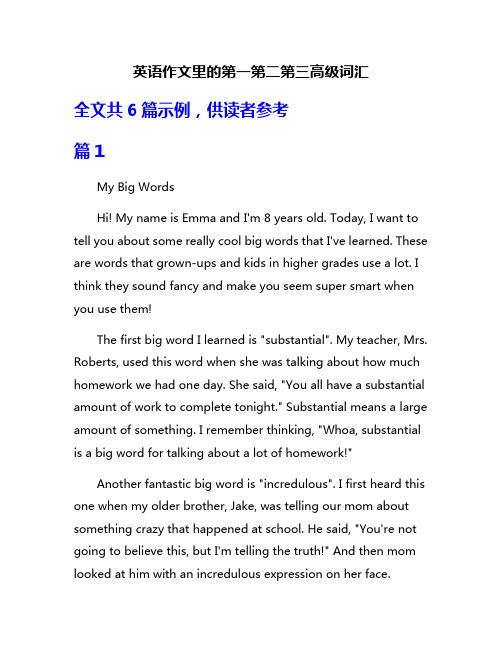
英语作文里的第一第二第三高级词汇全文共6篇示例,供读者参考篇1My Big WordsHi! My name is Emma and I'm 8 years old. Today, I want to tell you about some really cool big words that I've learned. These are words that grown-ups and kids in higher grades use a lot. I think they sound fancy and make you seem super smart when you use them!The first big word I learned is "substantial". My teacher, Mrs. Roberts, used this word when she was talking about how much homework we had one day. She said, "You all have a substantial amount of work to complete tonight." Substantial means a large amount of something. I remember thinking, "Whoa, substantial is a big word for talking about a lot of homework!"Another fantastic big word is "incredulous". I first heard this one when my older brother, Jake, was telling our mom about something crazy that happened at school. He said, "You're not going to believe this, but I'm telling the truth!" And then mom looked at him with an incredulous expression on her face.Incredulous means unwilling to believe something. It's kind of like saying, "Are you kidding me?" with your facial expression.The next cool big word is "diligent". Teachers really like using this one. Like when I'm working really hard on an assignment, mrs. Roberts might say, "Emma is being very diligent today." Diligent means working hard and carefully at something. Whenever a teacher calls me diligent, I feel proud because I know it means I'm doing a good job!Here's another fun big word: "meticulous". This one means showing great attention to detail. Like if I colored a picture using crayons and I stayed super neat within all the lines, someone could say, "You were meticulous with your coloring." Or they might say, "You did a meticulous job on that drawing." I try to be meticulous when I do arts and crafts because I think it looks better.One more big word I want to tell you about is "nonchalant". This is a tricky one! It means seeming calm and relaxed, like you don't care much about something. The other day, my friend Lily spilled her milk at lunch and made a huge mess. But she just shrugged her shoulders in a totally nonchalant way, like it was no big deal at all. I thought it was so funny how nonchalant she was acting about that giant spill!Those are some of the cool, high-level vocabulary words I've picked up from teachers, parents, older kids and books lately. I love learning big, fancy new words because it makes me feel smarter and more grown-up. Even though I'm just a kid, using words like substantial, incredulous, diligent, meticulous and nonchalant makes me sound way more advanced!I can't wait to learn more big words as I get older. It's fun practicing them and impressing people with my large vocabulary. Who knows, maybe one day I'll be a famous writer, speaker or teacher who gets to utilize all kinds of massive, sophisticated words! For now though, I'll do my best as an 8-year-old student to stay diligent with my work and continue expanding my knowledge of higher level vocabulary terms.What are some of your favorite big, advanced words? I'd love to hear them so I can keep building up my word collection! Thanks for reading my essay. Hopefully you found it to be super substantial!篇2The First, Second, and Third Most Advanced Vocabulary Words in English EssaysHi there! My name is Jamie and I'm in 5th grade. Today, I want to talk to you about something very important - the coolest, most advanced words we can use in our English essays! These words will make our writing sound smarter and more grown-up. Trust me, using big words is the key to getting good grades from our teachers.The first really advanced word is "plethora". I learned this word from my older sister who is in middle school. A plethora means a lot or an excessive amount of something. For example, you could say "There was a plethora of delicious snacks at the party" instead of just saying "There were a lot of snacks." See how much fancier that sounds?The second super advanced word is "quintessential". This is one of my favorites! Something quintessential is the most perfect example or representation of something. Like if you say "pizza is the quintessential Italian food", it means pizza is the food that best represents Italian cuisine. Using "quintessential" makes you sound so sophisticated.But the third and maybe most advanced word of all is "juxtaposition". I'll be honest, I had to ask my mom to explain this one to me a few times. Juxtaposition means putting two things side by side to compare and contrast them. You couldwrite something like "The juxtaposition of the ancient ruins next to the modern skyscrapers was striking." Doesn't that just roll off the tongue?Those are definitely the three toughest, most grown-up words I know for writing essays. But you know what's really cool? We can use them all in one amazing sentence! Like this:"There was a plethora of quintessential American snacks juxtaposed with an array of international cuisine at the multicultural food festival."Wow, I honestly impressed myself with that one. Just read it out loud - it's so fancy! I bet if we use sentences like that in our next essays, our teachers will be blown away by our advanced vocabulary skills.The main thing is to use any advanced vocabulary words accurately and in the proper context. There's no point in tossing around words like "plethora" and "juxtaposition" if we don't really understand their meanings. That will just make our essays seem silly and confusing.So in summary, my advice is this: Study up on some cool, advanced words like the ones I mentioned. Use them occasionally throughout your essays to elevate your writing andmake a great impression. But don't overdo it to the point where your essays stop making sense. Strike that perfect balance, and your English teachers will be in awe of your intelligent-sounding work!Well, that's all the writing wisdom I can impart for now. I hope these advanced vocabulary tips help you master your next big essay assignment. Let me know if you need any otherfifth-grade level writing advice. I'm always happy to share what I've learned so far!篇3My Most Memorable School DaysAttending elementary school was a pivotal period in my life, filled with numerous unforgettable experiences. From the initial day I stepped foot into the classroom until my final farewell, each year brought forth a myriad of cherished memories that have left an indelible mark on my heart.The first year was undoubtedly the most daunting, yet equally exhilarating. The primary challenge I faced was adapting to the entirely new environment, which was a stark contrast to the comfort of my home. However, with the unwavering supportof my parents and the warm embrace of my fellow classmates, I gradually acclimatized to this uncharted territory.One of the earliest recollections that remains etched in my mind is the inaugural day of school. The pristine halls, adorned with colorful artworks and vibrant displays, exuded an inviting aura that immediately captivated my senses. As I tentatively entered the classroom, I was greeted by the radiant smiles of my peers and the kind, nurturing demeanor of our teacher, Mrs. Henderson.From that moment on, each day became a tapestry woven with unforgettable experiences. The initial hurdle of learning to read and write was a daunting task, but Mrs. Henderson's patient guidance and creative teaching methods made the process not only enjoyable but also instilled in me a profound love for literature.The second year brought forth a newfound sense of confidence and camaraderie. Having established firm friendships and a familiarity with the school's routines, I approached each day with eagerness and zeal. It was during this time that my affinity for mathematics blossomed, ignited by the engaging lessons of Mr. Thompson, our arithmetic teacher.One particular memory that stands out vividly is the annual school play. I still remember the exhilarating sensation of treading upon the stage, clad in my costume, and delivering my lines with unwavering conviction. The thunderous applause that followed was a testament to the collective efforts of our class, and it filled me with an immense sense of accomplishment.The third year marked a significant transition, as we ventured into more advanced subjects and encountered new challenges. Science became a personal favorite, and the captivating experiments conducted by Mrs. Wilson, our science teacher, were a constant source of fascination. I vividly recall theawe-inspiring moment when we witnessed a chemical reaction unfold before our very eyes, transforming a mundane liquid into a vibrant array of colors.Beyond the academic realm, the third year also provided ample opportunities for personal growth. The school's annual camping trip remains etched in my memory as a transformative experience. Surrounded by the majesty of nature, we learned invaluable lessons about teamwork, resilience, and environmental stewardship.As the years progressed, each day brought forth new adventures, new friendships, and new opportunities for growth.From the boisterous laughter that echoed through the playground during recess to the quiet moments of contemplation in the library, every aspect of my elementary school experience has left an indelible mark on my character.Looking back, I am filled with a profound sense of gratitude for the educators who guided me, the friends who supported me, and the experiences that shaped me into the person I am today. Elementary school was not merely a place of learning; it was a sanctuary where dreams were nurtured, curiosity was ignited, and the foundation for a lifelong love of knowledge was laid.As I embark on new chapters of my academic journey, I carry with me the invaluable lessons and cherished memories from those formative years. They serve as a constant reminder of the power of perseverance, the joy of discovery, and the enduring bonds forged during those halcyon days of innocence and wonder.篇4My Inaugural Year in the Quintessential Educational InstitutionAs I inaugurated my tenure in the quintessential educational institution, a plethora of trepidations inundated my cerebralsphere. The panorama that manifested before my perspicacious eyes was an immense edifice, resplendent with multifarious chambers of erudition. Myriad diminutive homunculi scurried hither and thither, their countenances emblazoned with a kaleidoscope of emotions.In my nascent days as a novice scholar, the labyrinthine corridors appeared to be an insurmountable maze. I was a mere speck in a vast cosmos of knowledge, and the prospect of navigating this intricate realm filled me with consternation. Nonetheless, I was imbued with an indefatigable spirit and an insatiable curiosity that propelled me forward.The first hurdle I encountered was the formidable task of locating my designated sanctum of learning. I scrutinized the myriad plaques adorning the doors, each bearing inscrutable alphanumeric designations. Finally, after a peregrination that seemed interminable, I discovered the sacrosanct chamber where my inaugural tutelage would commence.Upon entering, I was immediately enveloped in an atmosphere redolent of fresh parchment and the musty aroma of ancient tomes. The preceptor, a venerable sage with a countenance etched by the indelible lines of wisdom, greetedme with a benevolent smile. They proceeded to elucidate the arcane precepts that would govern our academic odyssey.As the days transitioned into weeks, and the weeks into months, I found myself immersed in a kaleidoscope of subjects, each more captivating than the last. The realm of arithmetic challenged my mental faculties with its intricate calculations and conundrums, while the domain of linguistics unveiled the intricate tapestry of words and their nuanced meanings.In the sphere of literature, I was transported to realms both terrestrial and phantasmagorical, where the exploits of intrepid heroes and the machinations of nefarious villains unfolded before my very eyes. The annals of history regaled me with tales of bygone eras, replete with the triumphs and tribulations of civilizations long since consigned to the annals of time.The natural sciences unveiled the wonders of the cosmos, from the infinitesimal realm of subatomic particles to the vast expanse of celestial bodies that adorned the firmament. The study of biology revealed the intricate mechanisms that govern the resplendent tapestry of life, from the humble microorganism to the majestic leviathans that roamed the azure depths.As my mind expanded with each successive lesson, I found myself beholden to the tutelage of my erudite mentors. Theirpatience and sagacity knew no bounds, and they guided me through the labyrinth of knowledge with an unwavering dedication that inspired me to strive for excellence.Yet, the path to enlightenment was not without its arduous challenges. There were moments when the complexities of a particular concept seemed impenetrable, and the frustration threatened to overwhelm me. However, it was during these moments of adversity that I discovered the true mettle of my character.With perseverance and an indomitable spirit, I would persevere, seeking elucidation from my preceptors or delving into the hallowed repositories of knowledge until the elusive concept revealed itself to me. Each triumph, no matter how insignificant it may have seemed, fueled my motivation and propelled me forward on my quest for erudition.As the academic year drew to a close, I found myself reflecting upon the metamorphosis I had undergone. The once-overwhelming edifice had become a sanctuary of learning, and the intricate tapestry of knowledge that had once seemed impenetrable now unfolded before me with a newfound clarity.I had transcended from a neophyte scholar to a burgeoning savant, armed with a panoply of intellectual tools that wouldserve me well in the years to come. The quintessential educational institution had not merely imparted knowledge; it had cultivated within me a lifelong love for learning and an insatiable thirst for intellectual growth.As I bid farewell to the hallowed halls that had nurtured my academic odyssey, I carried with me a profound sense of gratitude. The mentors who had guided me, the peers who had accompanied me on this journey, and the institution itself had all played a pivotal role in shaping my intellectual and personal growth.With a heart brimming with anticipation, I eagerly awaited the next chapter of my educational sojourn, for I knew that the path to enlightenment was a never-ending odyssey, replete with challenges and triumphs, but ultimately leading to the pinnacle of human achievement – the acquisition of knowledge.篇5My Inaugural Day of SchoolToday was my primordial day of kindergarten! I was so excited, but also a bit nervous. My parents tried to assuage my trepidation by telling me how much fun I would have. They said Iwould make new companions and learn so many fascinating things.When we arrived at the edifice, I saw a plethora of other children with their progenitors. Some were tremulous like me, while others seemed perfectly composed. My parents and I proceeded to my classroom, where we encountered my instructor, Ms. Roberts. She was very amiable and greeted us warmly."Welcome!" she beamed. "I'm so delighted to meet you all on this maiden day."She showed us around the classroom, pointing out the cubbies for our belongings, the reading nook, and the centers for different subjects. Everything looked so engaging!After the preliminary introductions, it was time for my parents to depart. I felt a pang of separation anxiety as they left, but Ms. Roberts comforted me. "Don't fret, dear. You're going to have such an enjoyable time today!"The day commenced with me getting acquainted with my classmates through some icebreaker games. I met a girl named Emma who loved art just like me. A boy named Michael wantedto be a fireman when he grew up. There were so many intriguing personalities!Our second activity was circle time where we sang songs with motions and played games focused on numbers and letters.I already knew my ABCs and could count to 20, but I still delighted in the interactive lessons.After circle time, we transitioned to our initial academic lessons. We practiced writing our names and learned some sight words. I felt a swell of pride when I could read simple sentences all by myself!Around mid-morning, we had a nutrition break to snack and recharge. I had packed an apple, some crackers, and a juice box. My mom had tucked in a loving note that made me smile.When our refreshment time concluded, it was period for specials. On Mondays, we have music class! The sonant sounds of singing and percussion instruments filled the air. We danced and played games involving rhythm. It was an auditory delight!All too soon, it was time for outdoor recreation. My classmates and I frolicked on the playground, running, climbing, and exploring. I could feel the wind rustle through my tresses as I propelled myself on the swings. Recess was an absolute blast!Alas, our juncture outside had to terminate, and we returned indoors for our culminating lessons and activities before dismissal. We read a short book as a class, then crafted drawings to illustrate our favorite parts. I meticulously rendered the protagonist using my finely-sharpened colored pencils.At long last, the final bell chimed. My peers and I gathered our belongings and waited for our parents or guardians. When I spied my mom, I rushed to embrace her, bursting with tales of my remarkable first day."I had the most stupendous time!" I gushed. "I can't wait to go back tomorrow."My mom beamed, giving me an affectionate squeeze. "I'm so glad, sweetie. There are so many more wonderful days ahead."As we strolled home together, I couldn't stop grinning. My primordial day was better than I could have ever envisioned, and I knew it was just the inaugural of many amazing adventures to come in the secondary year of my scholastic journey.篇6Advanced Vocab Words Make My Essays Super Cool!Hi there! My name is Jamie and I'm a 4th grader. I love writing essays for school because it lets me use all sorts of big, fancy words that make me sound really smart. My teacher calls them "advanced vocabulary" words. Using lots of advanced words in my essays is one of my favorite things!When I first started writing essays in 2nd grade, I only knew basic words like "big," "small," "happy," and "sad." But now that I'm older and more experienced, I've learned tons of higher-level vocab words to spice up my writing. Instead of just saying something is "big," I can call it "gargantuan," "colossal," or "mammoth." Those fancier words just sound so much more intelligent and impressive.My friends think the advanced vocab makes my essays too difficult to understand sometimes. But I don't care - I'm trying to write at an elevated level here, people! Can you imagine how boring essays would be if we only used simple language? They'd be as dull as dishwater. Throwing in some linguistic flair with sophisticated terminology is what makes an essay truly shine.One of my go-to advanced words is "plethora." I use it all the time when I want to say there's a lot of something. Like "My backpack contains a plethora of school supplies" or "Summer camp had a plethora of fun activities." Doesn't "plethora" just rolloff the tongue in an erudite way? It's one of my favorite 4th grade words for sure.Another great advanced term is "quintessential." If something is the perfect example of its type, then it's quintessential. So a cozy library could be called "the quintessential reading environment." Or a hearty, homecooked meal from grandma's kitchen is "the quintessential embodiment of comfort food." Quintessential is definitely a mouthful to say, but that's part of what makes it such an elite vocabulary pick.Then there's the always useful "plethora's" friend, "myriad." If you need to express that there are numerous versions or types of something, whip out "myriad" for maximum impact. Like "There are myriad possibilities for how our science experiment could turn out" or "The garden contained a myriad of colorful blooms." Much more highbrow than simply saying "lots of possibilities" or "lots of flowers."I could ramble on indefinitely about other sophisticated words that enhance essays with their scholarly flair - "ubiquitous," "plausible," "anomaly," "ameliorate"...the list is virtually inexhaustible. But I'll spare you any further examples for now. I'm sure your mind is already spinning trying to process the verbal enrichment!The key thing to remember is that peppering essays with advanced vocabulary elevates the writing to a higher intellectual plane. It makes you sound like a mini-professor instead of a mere child putting pencil to paper. While the exact definitions of some rarefied words may elude me at times, I find that just incorporating them liberally tends to boost an essay's perceived sophistication.My ultimate dream is to one day craft an essay that's a seamless tapestry of esoteric 50-cent language. Every single sentence would be loaded with maximal lexical fanciness. Of course, I'd have to be cautious and not go overboard with obscure verbal accoutrements to the point where I become totally incomprehensible. An essay that no one can decipher defeats the purpose entirely. There's an art to achieving the perfect ratio of garrulous grandiloquence to plain speech.Even so, that's my aspirational goal - the quintessential magnum opus of maximal vocabularic resplendence! Just visualize an essay so ornate and linguistically ornate that even professors are forced to whip out their dusty dictionaries. Ah, what a immensely gratifying achievement that would be for a humble yet industrious pupil such as myself.For now though, I'll settle for doing my humble best to insert a plethora of sophisticated lingo into each new essay assignment. Whether I'm writing about summer vacation memories or analying the themes of our latest reading book, you'd better believe I'll cram in as many erudite words as possble. I want those graders to sit up and declare "My word, this pint-sized pupil has quite the capacious vocabulary!"So next time you're prepping an essay of your own, remember this lesson: Always opt for the 10 verb over the 1 one when you can. Why say "use" when you could say "utilize?" Why "talk" when you can "converse?" Anytime you have the chance to swap a basic word for a more scholarly-sounding alternative, seize that opportunity! It's a surefire way to make your essays shine with erudite panache.Well, I'd love to stay and enlighten you further on the merits of advanced vocabulary. But this elocuted essayist needs to acquire some postprandial restoration now. I've got biology homework still to conquer this evening - expect a myriad of bioscience jargon will be deftly woven in! Linguistics。
英语作文第二单元单词
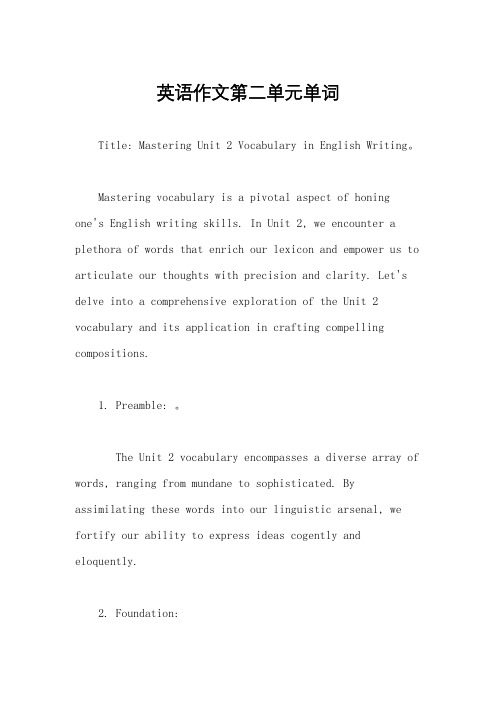
英语作文第二单元单词Title: Mastering Unit 2 Vocabulary in English Writing。
Mastering vocabulary is a pivotal aspect of honingone's English writing skills. In Unit 2, we encounter a plethora of words that enrich our lexicon and empower us to articulate our thoughts with precision and clarity. Let's delve into a comprehensive exploration of the Unit 2 vocabulary and its application in crafting compelling compositions.1. Preamble: 。
The Unit 2 vocabulary encompasses a diverse array of words, ranging from mundane to sophisticated. By assimilating these words into our linguistic arsenal, we fortify our ability to express ideas cogently and eloquently.2. Foundation:At the outset, it is imperative to establish a solid foundation by comprehending the nuances of each word. Engaging in mnemonic devices, such as creating mnemonic sentences or associations, can facilitate retention and recall.3. Integration:Integration of newly acquired vocabulary into our writing repertoire requires deliberate practice. Endeavor to incorporate these words organically, ensuring coherence and relevance within the context of your composition.4. Synthesis:Synthesizing Unit 2 vocabulary enables us to construct sentences imbued with sophistication and depth. Employing synonyms and antonyms judiciously amplifies the richness of our prose, captivating the reader's attention.5. Examples:Let us elucidate the application of Unit 2 vocabulary through illustrative examples:Ubiquitous: The ubiquitous presence of smartphones in contemporary society underscores the pervasiveness of technology in our daily lives.Paradox: The concept of time travel presents a paradox, wherein altering the past could potentially negate one's existence in the future.Conducive: A conducive learning environment fosters academic excellence by nurturing students' curiosity and engagement.Mitigate: Implementing stringent environmental policies is imperative to mitigate the adverse effects of climate change on future generations.Inherent: The inherent resilience of the humanspirit enables individuals to persevere amidst adversityand emerge stronger.6. Elaboration:Elaborating on Unit 2 vocabulary elucidates our mastery of language. Employ descriptive adjectives and adverbs to embellish your prose, painting vivid imagerythat evokes the reader's imagination.7. Revision:Revision serves as a catalyst for refining our writing, ensuring coherence, conciseness, and clarity. Scrutinize your composition meticulously, substituting pedestrian words with Unit 2 vocabulary to enhance its eloquence and sophistication.8. Conclusion:In conclusion, mastering Unit 2 vocabulary is indispensable for fostering proficiency in English writing. By embracing these words as indispensable tools in ourlinguistic arsenal, we embark on a transformative journey towards eloquence and fluency.In essence, the assimilation and application of Unit 2 vocabulary empower us to articulate our ideas with eloquence, precision, and sophistication. Let us embark on this linguistic odyssey with zeal and determination, for it is through mastery of language that we unlock the boundless potential of self-expression.。
高中英语作文读后续写高级句子分类背诵2(感动 尴尬 好奇 愤怒)
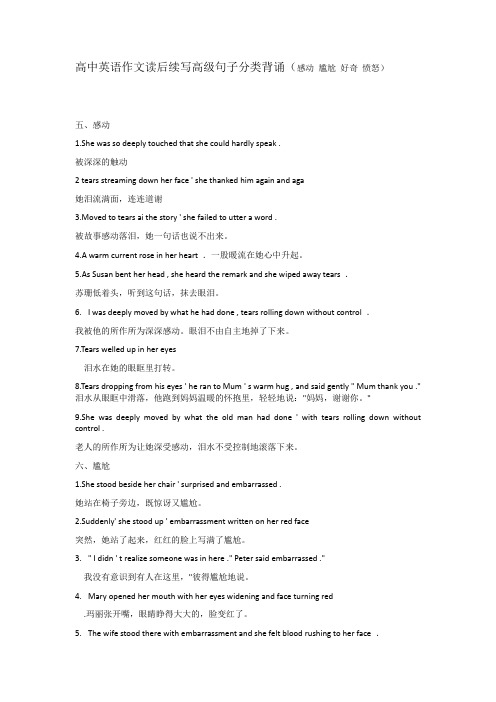
高中英语作文读后续写高级句子分类背诵(感动尴尬好奇愤怒)五、感动1.She was so deeply touched that she could hardly speak .被深深的触动2 tears streaming down her face ' she thanked him again and aga她泪流满面,连连道谢3.Moved to tears ai the story ' she failed to utter a word .被故事感动落泪,她一句话也说不出来。
4.A warm current rose in her heart .一股暖流在她心中升起。
5.As Susan bent her head , she heard the remark and she wiped away tears .苏珊低着头,听到这句话,抹去眼泪。
6.I was deeply moved by what he had done , tears rolling down without control .我被他的所作所为深深感动。
眼泪不由自主地掉了下来。
7.Tears welled up in her eyes泪水在她的眼眶里打转。
8.Tears dropping from his eyes ' he ran to Mum ' s warm hug , and said gently " Mum thank you ."泪水从眼眶中滑落,他跑到妈妈温暖的怀抱里,轻轻地说:"妈妈,谢谢你。
"9.She was deeply moved by what the old man had done ' with tears rolling down without control .老人的所作所为让她深受感动,泪水不受控制地滚落下来。
英语作文中常用的谚语集锦2
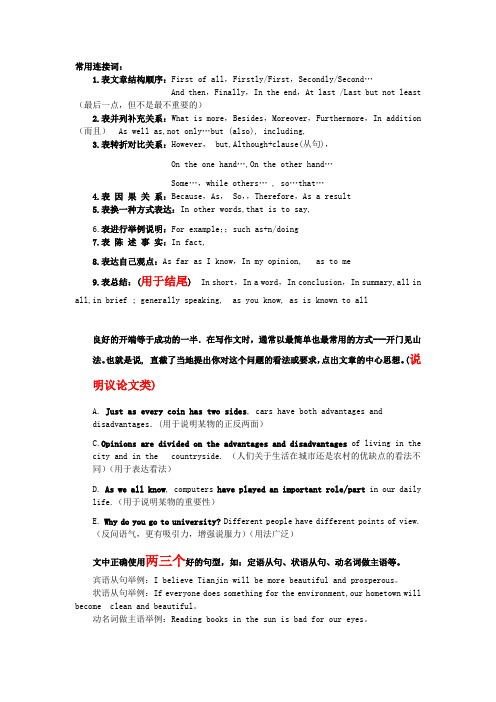
常用连接词:1.表文章结构顺序:First of all,Firstly/First,Secondly/Second…And then,Finally,In the end,At last /Last but not least(最后一点,但不是最不重要的)2.表并列补充关系:What is more,Besides,Moreover,Furthermore,In addition(而且) As well as,not only…but (also), including,3.表转折对比关系:However, but,Although+clause(从句),On the one hand…,On the other hand…Some…,while others… , so…that…4.表因果关系:Because,As, So,,Therefore,As a result5.表换一种方式表达:In other words,that is to say,6.表进行举例说明:For example;;such as+n/doing7.表陈述事实:In fact,8.表达自己观点:As far as I know,In my opinion, as to me9.表总结:(用于结尾) In short,In a word,In conclusion,In summary,all in all,in brief ; generally speaking, as you know, as is known to all良好的开端等于成功的一半.在写作文时,通常以最简单也最常用的方式---开门见山法。
也就是说, 直截了当地提出你对这个问题的看法或要求,点出文章的中心思想。
(说明议论文类)A. Just as every coin has two sides, cars have both advantages anddisadvantages.(用于说明某物的正反两面)C.Opinions are divided on the advantages and disadvantages of living in thecity and in the countryside. (人们关于生活在城市还是农村的优缺点的看法不同)(用于表达看法)D. As we all know, computers have played an important role/part in our dailylife.(用于说明某物的重要性)E. Why do you go to university?Different people have different points of view.(反问语气,更有吸引力,增强说服力)(用法广泛)文中正确使用两三个好的句型,如:定语从句、状语从句、动名词做主语等。
大作文英语二词汇
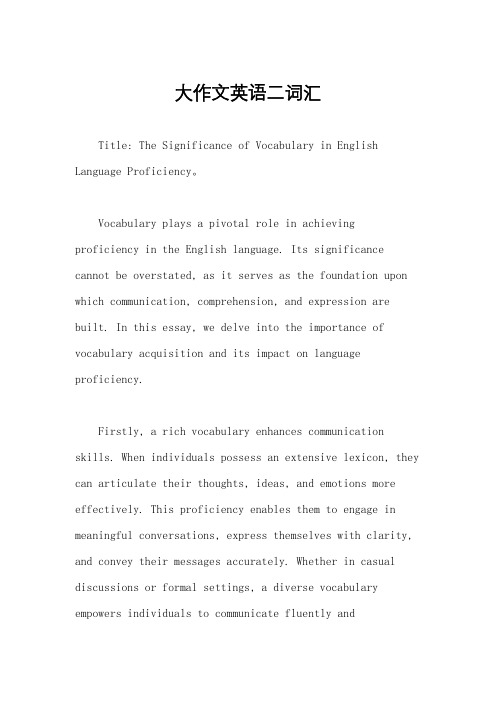
大作文英语二词汇Title: The Significance of Vocabulary in English Language Proficiency。
Vocabulary plays a pivotal role in achievingproficiency in the English language. Its significance cannot be overstated, as it serves as the foundation upon which communication, comprehension, and expression are built. In this essay, we delve into the importance of vocabulary acquisition and its impact on language proficiency.Firstly, a rich vocabulary enhances communication skills. When individuals possess an extensive lexicon, they can articulate their thoughts, ideas, and emotions more effectively. This proficiency enables them to engage in meaningful conversations, express themselves with clarity, and convey their messages accurately. Whether in casual discussions or formal settings, a diverse vocabulary empowers individuals to communicate fluently andpersuasively.Moreover, vocabulary acquisition facilitates comprehension across various contexts. In both written and spoken forms, encountering unfamiliar words can impede understanding. However, individuals with a robustvocabulary can decipher the meanings of new words through context clues or prior knowledge. Consequently, they can comprehend complex texts, grasp nuanced concepts, andextract key information more efficiently. This ability is particularly advantageous in academic, professional, and everyday scenarios where comprehension is essential.Furthermore, vocabulary proficiency fosters language fluency and proficiency. As individuals expand their lexicon, they gain access to a broader range of expressions, idioms, and phrasal verbs. This linguistic diversityenables them to adapt their language usage to different situations, audiences, and purposes. Consequently, they can express themselves more creatively, convey subtleties of meaning, and engage in sophisticated discourse. Language fluency not only enhances communication but also reflects adeeper understanding and mastery of the English language.In addition, vocabulary acquisition is integral to academic success. In educational settings, students encounter a myriad of texts across various subjects, each containing subject-specific terminology and technical jargon. By actively expanding their vocabulary, students can navigate academic materials more effectively, comprehend complex concepts, and communicate their understanding proficiently. Moreover, a strong vocabulary enhances students' performance in standardized tests, essays, and presentations, contributing to their overall academic achievement.Furthermore, vocabulary proficiency is closely linked to cognitive development and critical thinking skills. As individuals engage with new words, they are required to analyze their meanings, infer contextual usage, and make connections with existing knowledge. This cognitive process strengthens their analytical skills, expands theircognitive flexibility, and fosters a deeper understanding of language structure and semantics. Moreover, researchsuggests that individuals with a rich vocabulary demonstrate superior cognitive abilities, including problem-solving, decision-making, and abstract reasoning.In conclusion, vocabulary acquisition is paramount to achieving proficiency in the English language. A rich and diverse lexicon enhances communication skills, facilitates comprehension, fosters language fluency, contributes to academic success, and promotes cognitive development. Therefore, individuals aspiring to master English should prioritize vocabulary acquisition through regular practice, exposure to diverse linguistic contexts, and active engagement with texts. By investing in vocabulary development, individuals can unlock the full potential of their language proficiency and broaden their opportunities for academic, professional, and personal growth.。
高中英语作文生态环境素材与词汇
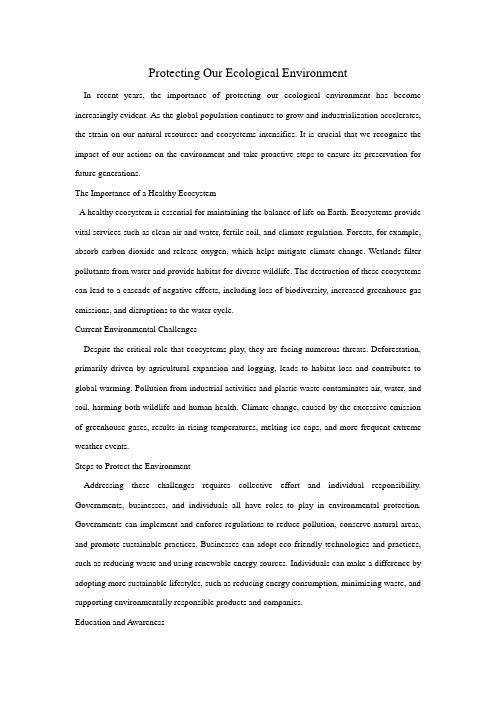
Protecting Our Ecological EnvironmentIn recent years, the importance of protecting our ecological environment has become increasingly evident. As the global population continues to grow and industrialization accelerates, the strain on our natural resources and ecosystems intensifies. It is crucial that we recognize the impact of our actions on the environment and take proactive steps to ensure its preservation for future generations.The Importance of a Healthy EcosystemA healthy ecosystem is essential for maintaining the balance of life on Earth. Ecosystems provide vital services such as clean air and water, fertile soil, and climate regulation. Forests, for example, absorb carbon dioxide and release oxygen, which helps mitigate climate change. Wetlands filter pollutants from water and provide habitat for diverse wildlife. The destruction of these ecosystems can lead to a cascade of negative effects, including loss of biodiversity, increased greenhouse gas emissions, and disruptions to the water cycle.Current Environmental ChallengesDespite the critical role that ecosystems play, they are facing numerous threats. Deforestation, primarily driven by agricultural expansion and logging, leads to habitat loss and contributes to global warming. Pollution from industrial activities and plastic waste contaminates air, water, and soil, harming both wildlife and human health. Climate change, caused by the excessive emission of greenhouse gases, results in rising temperatures, melting ice caps, and more frequent extreme weather events.Steps to Protect the EnvironmentAddressing these challenges requires collective effort and individual responsibility. Governments, businesses, and individuals all have roles to play in environmental protection. Governments can implement and enforce regulations to reduce pollution, conserve natural areas, and promote sustainable practices. Businesses can adopt eco-friendly technologies and practices, such as reducing waste and using renewable energy sources. Individuals can make a difference by adopting more sustainable lifestyles, such as reducing energy consumption, minimizing waste, and supporting environmentally responsible products and companies.Education and AwarenessEducation is key to fostering a culture of environmental stewardship. By raising awareness about environmental issues and the importance of conservation, we can encourage more people to take action. Schools, community organizations, and media play a vital role in educating the public about how their choices impact the environment and how they can contribute to its protection. ConclusionProtecting our ecological environment is not just a matter of conserving nature; it is essential for ensuring the health and well-being of all living things. By addressing environmental challenges through collective action, responsible practices, and education, we can work towards a sustainable future. It is our duty to safeguard the planet for ourselves and future generations, and together, we can make a positive impact on the world.。
- 1、下载文档前请自行甄别文档内容的完整性,平台不提供额外的编辑、内容补充、找答案等附加服务。
- 2、"仅部分预览"的文档,不可在线预览部分如存在完整性等问题,可反馈申请退款(可完整预览的文档不适用该条件!)。
- 3、如文档侵犯您的权益,请联系客服反馈,我们会尽快为您处理(人工客服工作时间:9:00-18:30)。
话题1 学校生活及成绩campus(校园),facilities(设施), goal(目标),course(课程), enthusiastic(热情的), confident(有信心的), easy-going(随和的), distract(走神)be getting on well with one’s study(学习好)take several courses at school(参加一些课程)work hard at…(在某方面很努力)put one’s heart into(用心做某事)like English/chemistry/Chinese/physics best(最喜欢)be good at/do well in (擅长)be poor at/ be weak in(不擅长)make progress in(取得进步)pass the examination/give sb. a passing grade(通过考试)get an A in the exam(考试成绩优秀)major in English//chemistry/Chinese/physics(主修)be the top student in our class/have the best record in school(成绩好)get a bachelor’s/master’s/ doctor’s degree(获得学士、硕士、博士学位)be active in class/take an active part in…(课堂表现活跃)work out (maths)problem(解决……问题)have a good command of (……掌握得好)lay a good foundation in (language study) (……方面基础好)话题2 学生兴趣爱好及课余活动spare time(业余时间), favorite(最喜欢的), Interest(兴趣), hobby(爱好), appetite(嗜好),taste(口味), read novels(读小说), play golf/basketball(打高尔夫/篮球), surf the internet(上网), chat online(在线聊天), play video games(玩电子游戏), collect stamps(集邮), make e-friends(交网友), climb mountains(爬山), go camping(去露营), enjoy rock music(喜欢摇滚音乐),be interested in(对…感兴趣), develop an interest in(在…方面发展兴趣), be fond of(喜欢…),be keen on(喜欢…), have love for(喜爱…), have a taste in(对…有兴趣)spend one’s time in many different ways(以不同方式打发时间)go for an outing/have an outing (进行户外活动)have a picnic at the weekend(周末野餐)enjoy a family trip(享受家庭旅行)enjoy a change from our busy life(从忙碌的生活中摆脱出来)relaxing Sunday(放松的周日)话题3 友谊get to know sb.(认识某人), know sb. reallywell(熟知某人), make friends with sb.(和某人交朋友), a strongpersonality (一个很强的个性), personal matters(隐私), friendship(友谊), friendly(友好的), a close friend(一个亲密的朋友), trust each other (相互信任), precious(珍贵的), worthy(有价值的), understanding(通情达理的), share …with sb.(与…分享…), be loyal to(对…忠诚), keep in touch with sb. (与…保持联系), keep company with sb.(和…结交), stay best friends withsb. (和…保持很好的友谊)话题4 健康问题physical and mental condition(身体与精神状态), strong(强壮的), un/healthy(不健康/健康的), overweight/fat(肥胖的), thin(瘦的), near/short-sighted(近视的), mentallyunhealthy(精神不健全的), normal(正常的), abnormal(不正常的), energetic(精力旺盛的), unhealthy eating habit(不健康的饮食习惯), eat much junk food (吃太多的垃圾食品)等,Stay/keep healthy/fit(保持健康), build up one’s body/ improve one’s' health(强身健体), enough sleep(充足的睡眠), take regularexercise(进行有规律的运动), proper diet(合理的饮食), good living habits(良好的生活习惯), lose weight(减肥), remove heavy burdens(减轻负担), be good for/dogood to(对…有益处), nutrition(营养), go on diet(节食), form a … eating habit(养成一个…的饮食习惯)话题5 求职和招聘interview(面试), commubity servise(社区服务), pocket money(零用钱), spare time(业余时间), challenging(有挑战的), waste time in(在……方面浪费时间), employ(雇佣), look for(寻找), take in(吸纳), full-time(全职的), part-time(兼职的), well-paid(薪水高的), be paid by thehour(按小时发工资), requirement(要求), résumé(个人履历),schooling(受教育情况), subjects(课程), working experience(工作经历), qualification(合格证明), transcript (成绩单), health(健康状况), present address(现在通讯地址)等,apply for(申请…), graduate from(毕业于), major in(以…为专业), degree(学位), scholarship(奖学金), good grades(良好的成绩), hobby(爱好), favorite(最喜欢的), be skilled in(在…方面熟练), be good at(擅长…), experienced(有经验的), confident(自信的), English and computer ability(英语和计算机能力), healthy(健康的),voluntary labor(义务劳动),physical labor(体力劳动), mental labor(脑力劳动), workday(工作日), be devoted to(奉献于..), value(价值), earn money(赚钱) , personal interests(个人利益)话题6 环境保护climate(气候), environmental-friendly(环境友好的), ecological(生态的), pollute(污染),Waste is scattering here and there.(到处撒满了废弃物),protect the environment(保护环境) ,save energy(节省能源),solar energy(太阳能),send out smoke and poisonous gases into the air(散发出烟和有毒气体);cut down trees(砍伐树木) ;pour waste water into the rivers(把废水注入河流);It is a shame to throw rubbish around. (乱扔垃圾是可耻的);form good habits to protect the surroundings(养成良好的习惯来保护环境);take active measures to protect rare animals(采取积极措施保护稀有动物) ;take good care of our forests(关心我们的森林);plant more trees to improve the environment (多植来改善环境);The terrible pollution have done great harm to us as well as tothe surroundings.(可怕的污染已经给我们自己还有我们的环境带来了很大的危害。
)话题7 中外交流Confucius Institute (孔子学院), sister cities (友好城市), local culture (本土文化), mass culture (大众文化), oriental culture (东方文化), traditional (传统的), decorate (装饰), get together (聚集), set off fireworks(放烟火), lucky money(压岁钱),celebrate the springfestival(过年),spring festival couplets(春联),paper-cuts(剪纸),new year paintings(年画),do shopping for the spring festival/ do spring festival shopping(买年货),firecrackers(爆竹) redpackets (红包),lion dance(舞狮),dragon dance (舞龙),traditional opera(戏曲)。
